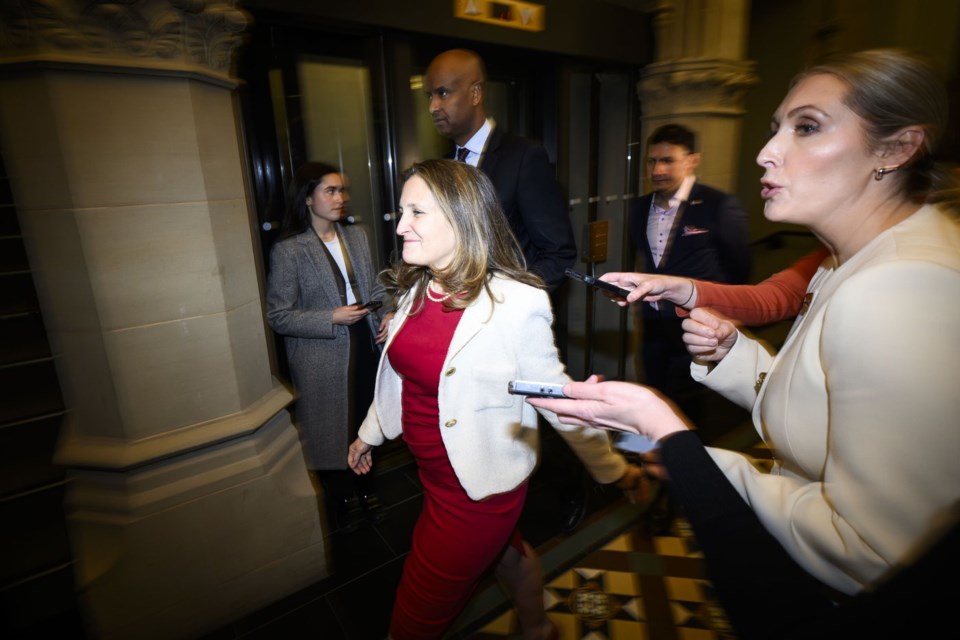OTTAWA — Liberal leadership candidate Chrystia Freeland's plan to fix the housing shortage would tie the number of newcomers Canada admits to housing availability.
The former finance minister made the promise in a 10-point policy document her campaign issued Monday morning. Freeland said the move would slow down population growth until housing affordability stabilizes.
Conservative Leader Pierre Poilievre has been promising for some time now to tie immigration numbers to housing starts.
Under the federal government's current immigration plan, the number of permanent residents being admitted is set to decline annually until it reaches 365,000 in 2027. The previous goal was to admit upwards of 500,000 permanent residents annually from 2024 to 2026.
The link between immigration and housing starts isn't the only thing the Freeland and Poilievre plans have in common.
Freeland is calling on cities to slash their development charges to lower home building costs — and is threatening to withhold federal infrastructure funding if they don't.
Poilievre made a similar proposal to tie federal transfers to municipalities to the number of housing starts they report.
Both Freeland and Poilievre are pledging to remove the GST from new homes for first-time buyers. Freeland, however, has said she would drop the GST from sales of new homes worth up to $1.5 million, while Poilievre has said he'd remove the tax from sales of new homes for under $1 million.
Melissa Lantsman, Conservative deputy leader, introduced an opposition motion to enact Poilievre's GST pitch on Dec. 10, 2024. That motion was defeated when the Bloc Québécois and the Liberals — Freeland included — voted against it.
Freeland has said that if she wins the Liberal leadership and becomes prime minister, she also will ban the practice of landlords using artificial intelligence to analyze a renter's personal information in order to set rents.
MP Bonita Zarrillo, NDP infrastructure and communities critic, began raising this issue in September of last year and called for a Competition Bureau investigation, arguing that landlords are using AI to "illegally jack up rents."
The Competition Bureau confirmed to The Canadian Press on Monday that it is investigating algorithmic pricing in the rental market.
Independent media outlet The Breach first reported the investigation was taking place on Nov. 27, 2024, but the bureau would not confirm the investigation at the time.
Other portions of Freeland's housing plan would build on existing Liberal policies by, among other things, increasing the annual contribution ceiling for the Tax-Free First Home Savings Account to $10,000 from $8,000, and offering financing to help factories build more modular homes.
Freeland is one of five candidates competing to replace Prime Minister Justin Trudeau as Liberal leader and has produced a flurry of policy pitches to help her stand out from the pack.
Liberal candidate Ruby Dhalla said she would appoint a "housing czar" to tackle the housing crisis.
In an email Monday, Dhalla's press secretary Jacy Lafontaine said the appointee's sole mandate would be "building housing and cutting the red tape that’s stalling development."
Lafontaine said Dhalla pledged to introduce a moratorium period during which investors selling their properties would not be charged a capital gains tax. Her plan also calls for federal housing laws to streamline approvals and unlocking the Agricultural Land Reserve "to let the market — not provincial governments — determine where housing should go."
"Provinces failing to meet new requirements will see reductions in transfer payments and other penalties to ensure accountability," Lafontaine said.
Last week, rival candidate Mark Carney pledged incentives to encourage construction of prefabricated homes but did not offer details of his plan.
Earlier this month, candidate Karina Gould promised to expand cooperative housing, "accelerate" modular housing construction and offer a $2,000 tax credit to first-time homebuyers.
Former MP Frank Baylis is also running for the Liberal leadership.
A spokesperson for the Baylis campaign said he will be releasing policy statements all week ahead of the leadership debates on Feb. 24 and 25.
Liberals will choose their next leader, and Canada's new prime minister, at a convention in Ottawa on March 9.
This report by The Canadian Press was first published Feb. 17, 2025.
David Baxter and Kyle Duggan, The Canadian Press
